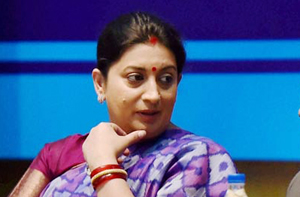New Delhi, Aug 19: A crucial day-long meeting of the highest advisory body on education began here today to consider reviewing the no-detention policy up to class 8 and reintroduction of class 10 board examination.
The meeting is being chaired by HRD Minister Smriti Irani, where the Women and Child Development Minister Maneka Gandhi suggested supplying of sanitary napkins in schools to reduce dropout rates among girls.
The suggestion was supported by several states and a commitment was given by the government at the meeting to implement it soon.
The meeting would also consider a proposal for extension of the Right to Free and Compulsory Education Act up to class 10 in the secondary level and to nursery in the pre-school stage.
This is the first meeting of the newly reconstituted Central Advisory Board of Education (CABE) under the NDA government.
On the agenda would be discussions on the proposed new national education policy where the states' participation is crucial.
State Education Ministers and secretaries along with academicians and nominated members of CABE are attending the meeting.
At the inaugural discussion, Irani laid emphasis on states' participation in the framing the education policy while Health Minister J P Nadda underscored the need for inclusion of courses on health studies in the curriculum along with emphasis on pictorial content in study materials.
He also supported the suggestion of a few members for issuing health cards to students in schools.
The focus of the day-long meeting would, however, be on a report of a CABE sub-committee which had suggested review of the no-detention policy up to class 8.
The committee suggested to end the policy in a phased manner and reintroduce class promotion from class 5 onwards.
"We need to stop, re-assess and then move forward. At this stage, it would be prudent to reiterate the need for assessment of the learning outcomes and make it consequential by linking it to promotion or otherwise to the next class beyond grade 5," the committee had said in its report.
A few states have already repealed the policy, which had come into effect with the implementation of RTE by bringing in necessary amendments to the state rules.
The RTE Act, which makes education a fundamental right of every child between the age of 6 and 14, came into effect on April 1, 2010. It requires all private schools, except for minority institutions, to reserve 25 per cent of seats for underprivileged children.





Comments
Add new comment